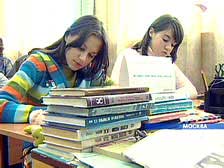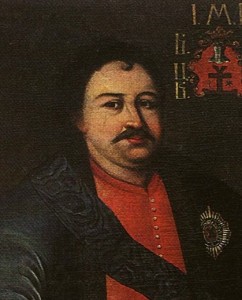DONETSK, Ukraine | Olena Yegorova wept through a winter night before her last day as a history teacher in this eastern Ukrainian city. That day in January, she gave a lesson on the Orange Revolution to a 12th-grade class.
New material added to history textbooks after the tumultuous presidential election of 2004 portrays the triumph of the “orange” coalition led by Viktor Yushchenko as “a victory for all Ukrainians who want to live a rich and happy life.” Like many in this part of Ukraine, Yegorova, 29, did not share those views about the political changes since 2004. When she learned that the government planned to issue new history textbooks, she decided to stop teaching. She could not present information she did not believe was true.
Nation Building
While teachers, historians, and students take radically different views of the quality and trustworthiness of the history textbooks used in Ukrainian schools, nearly all agree that the new books are designed not only to teach facts and generally accepted interpretations of past events, but also to help inculcate a new model of Ukrainian nationhood.
“I’m not saying that the current textbooks are bad or good. But every generation requires new textbooks, even textbooks of physics or mathematics,” Education and Science Minister Ivan Vakarchuk told the media. “If we talk about history, if we create a transparent historical past, we must educate not only young people – pupils and students – but ourselves as well, about those historical events that actually took place. Interpreting this or that phenomenon from our past is another question.”
“Teaching in different regions of Ukraine differs even for Ukrainian children,” says Konstantin Bondarenko, a political scientist who directs the Gorshenin Institute of Management Issues in Kyiv. “In Crimea a little Tatar learns in a history lesson that his ancestors were indigenous enemies of Ukrainians, in Lviv a little Pole learns that Poles and Ukrainians are enemies.”
Oksana Veligorskaya, a history teacher in the central Ukrainian city of Poltava points out that the present textbooks are not perfect. “The new books will be written by professionals. I think they will be able to relate facts and opinions properly.”
“It’s common today to say that each new textbook expounds the same events in its own way: heroes become villains and vice versa,” Veligorskaya adds. “A textbook is not only a short set of facts and opinions about the past. It also performs national, ideological, and governmental functions. If we think about it, it’s clear that the Ukrainian authorities are right to revise textbooks. In doing so, they are acting on behalf of Ukraine.”
See-Saw History
In 2004, Yegorova waved a flag at anti-Orange rallies in Donetsk. Many of her current students and their parents participated in those demonstrations. They remember that more than 90 percent of voters in the area backed Viktor Yanukovych, the presidential candidate Yushchenko defeated in a new round of voting after a wave of popular protest over what was widely seen as a manipulated victory for Yanukovych. Yanukovych drew much of his support from the Russian-speaking east and south of the country.
Yegorova spent the next four years teaching from the officially approved textbooks, including the new sections added after Yushchenko and his allies came to power. She had no choice because teachers enjoy very little leeway to depart from the assigned texts.
Concerns about the teaching of history have been in the air since the country became independent in 1991, long before the “orange” election victory. To see how people’s ingrained views of the Ukrainian past match what is taught in schools, I visited a typical secondary school in the capital, Kyiv, where Viktoriya Stepanova was preparing to teach a class of ninth graders about the Cossack chieftain (hetman), Ivan Mazepa. For half of her professional career, Stepanova, 53, portrayed Mazepa as a disgraceful traitor who abandoned his allegiance to the Russian Czar Peter the Great during the Great Northern War against Sweden. That image persisted in Ukraine throughout Soviet history, only to take a U-turn with the new textbooks written after the Soviet Union collapsed. Mazepa is now viewed as an iconic figure, an independence fighter.
A textbook used in this school during the Soviet period states, “Mazepa sought to return Left-bank Ukraine to Polish control and struck secret deals with Poland and Sweden against Russia. Attempts to forestall the hetman’s treason failed. When Swedish forces invaded Ukraine, Mazepa and a handful of his supporters sided with them. But the Ukrainian people remained true in their allegiance to an alliance with Russia and began a people’s war against the Swedish invaders.”
Contrast this passage from a book taught to today’s students: “Mazepa sought to make Ukraine a great and powerful European state and free it from the Muscovy czar’s oppression.”
I asked students what they thought about Mazepa. Nearly half of them said they had not followed the teacher: some were not listening, one was reading a magazine, another was playing a video game on a handheld Gameboy.
“Most students do not search for historical truth,” says Inna Kharlova, one of the students who was paying attention. “To find out who Mazepa was, a hero or a traitor, you have to read a lot of specialized literature and analyze it. Most students never do it. They accept the interpretation laid down in the textbook. But contemporary history and the Orange Revolution often trigger a heated debate.”
Another student, Anton Kotov, notes that “history is presented in a boring way; textbooks are dull, while teachers are required to stick to them. Many students never try to reflect on the subject but just memorize the necessary chapter before a test or exam.”
Ala Prikhodko, an excellent student, says she enjoys history but never questions the official story during lessons. “I cannot tell the teacher that the textbook lies. Well, I can, but what is the point? Even if a teacher shares my opinion, he will never admit it because he is required to follow the textbook.”
Stepanova says that teachers in Ukraine cannot be unbiased because textbooks are subjective. “Textbooks do not only lay out bare facts but they also impose an attitude on students. Of course, textbooks shape images of enemies or heroes in students’ minds.”
‘Nobody is Going to Rewrite History’
The characterization of Mazepa is just one example of “rethinking” Ukrainian history. In 1991, a considerable part of the history taught in schools was rewritten to reverse the polarities of major historical figures. Then, after the Orange Revolution, new material on recent events was added. On each occasion, the process triggered controversy and met with mixed reactions. Many residents in eastern Ukraine consider the old, Soviet-era version more credible. Perceptions are different in the west of the country.
“Many historic figures – Mazepa, Konovalets, Bandera and others – are seen as traitors in eastern Ukraine and as heroes in its western areas,” says Andriy Shevchenko, 40, a businessman from the western city of Ivano-Frankivsk. Yevhen Konovalets and Stepan Bandera, commanders of the west Ukrainian nationalist movement in the 1930s and 1940s respectively, were anathema to Soviet rulers and their legacy still divides Ukrainians. “But the authorities rewrite textbooks too often. This is an absurd situation and the reason for it is the total politicization of society as a whole and scholarship in particular.”
“Like during the Great Northern War, some Ukrainians are in favor of closer ties with Russia and others, like Mazepa, are hostile toward Russia and want closer ties with the West,” says Fyodor Prikhodko, 28, a dentist from Odessa. “You can’t say for sure who is right. Everyone has reasons to think one way or another. But the authorities impose their interpretation.”
In 2008, the government decided the time was right for new textbooks “to renew and maintain the national memory of the Ukrainian people,” as the directive signed by Prime Minister Yulia Tymoshenko stated. The task was entrusted to the state’s historical research and education body, the Institute of National Memory. The government expects the new books, which may be completely new or revisions of existing books, to help create a stronger sense of national identity and inspire young people with “respect and love for the Motherland.”
The books are not expected to be released until the beginning of the 2009-2010 school year at the earliest. While no details concerning the content have been made public, discussion is under way as to what the new version of history should be like. The project may face a challenge from political opponents of Yushchenko as well as the government led by Tymoshenko, his onetime Orange Revolution ally. The Communist Party of Ukraine calls for the removal of chapters about the Orange Revolution and Yushchenko, and urges the authorities to “stop mutilating children’s minds by slinging mud at the great deeds of Soviet war veterans and glorifying criminals.”
Vadim Kolesnichenko, an MP from Yanukovych’s Regions Party, Ukraine’s major opposition force, favors starting from scratch with brand-new, politically neutral textbooks commissioned “by a broad circle of real experts who understand that events that really took place on this territory are important rather than the ideas and ideology of the current government.”
The institution commissioned to draft the new books has tried to put a lid on talk that the next generation of students will be force-fed a biased or anti-Russian view of the Ukrainian past.
“Nobody is going to rewrite history,” the deputy director of the Institute of National Memory, Vladislav Verstyuk, told journalists.
Verstyuk stressed that the new books are intended to modernize the teaching of history in Ukraine.
“We’re talking about improvement of textbooks, going away from Soviet and approaching European standards. Debatable instances of Ukrainian-Russian or Ukrainian-Polish relations should be described tolerantly.” Yet, he went on, “We aren’t trying to conceal that history textbooks are powerful instruments in the formation of national identity.”
It is precisely this nation-building part of the project that has some teachers worried.
In Kyiv, Viktoriya Stepanova says, “Many people criticize the current textbooks. But based on politicians’ rhetoric, one can hardly expect the new textbooks to be objective.”
“The news that we will have to revise history and reassess our values again came as a shock to many,” Yegorova, the former teacher, says. “During my last lesson [on the Orange Revolution] students accused me of telling lies out of fear. I cannot be objective. In the current system, I have to share the ideology dictated by the authorities. While politicians argue about the content of the new textbooks, we are waiting to see who will have the upper hand. Who will be declared a hero and who will be declared an enemy tomorrow? I was tired of the changes, so I quit my job. A large number of teachers and students are captive to this system.”
Tags: Minorities


